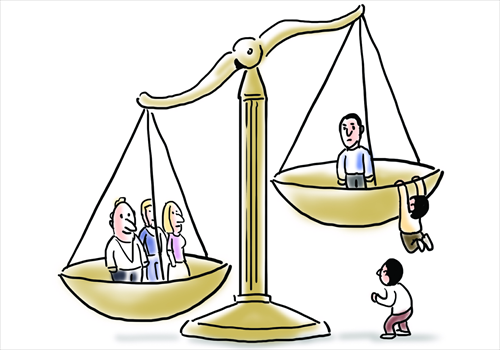HOME >> OP-ED
Injustice lights fire under Asian-Americans
By Rong Xiaoqing Source:Global Times Published: 2016/4/7 20:38:01

Illustration: Liu Rui/GT
I met Richard Sun recently at an event held by the Museum of Chinese in America in New York. With a pair of black rim glasses and a baby face, Sun could pass for a high school student. But at the age of 25, he was inaugurated in January as a council member in Summit, New Jersey. He is the first Asian, first minority and the youngest council member in the city - and the second youngest council member is his father.
Sun's parents are immigrants from Shanghai. He was born in New York and grew up in Summit. He went to Columbia University to study economics and then came back to Summit to work for a consulting company.
Sun told me his parents grew up in the Cultural Revolution era in China and had few opportunities. And Summit offered him so many opportunities. That's the reason he wanted to run for public office there, so he can give back to the community.
Sun's rise in the public service field is not a coincidence but part of a trend for Asians, especially those in the younger generation, to participate in politics.
Across the river in New York, 33-year-old Yuh-Line Niou who was born in Taiwan, grew up in Texas and holds a master's degree in public management from City University of New York, is running for the State Assembly in district 65, a seat vacated by veteran politician Sheldon Silver after he was convicted of corruption offences. Gigi Li, a 35-year-old who was born in Hong Kong, grew up in New York and graduated from Smith College and Columbia University, is aiming at the same seat.
Down the road in Pennsylvania, 25-year-old Princeton University graduate Lindy Li, who was born in Sichuan and grew up in the state, had been running for Congress until she withdrew on April 1 after her petition collecting necessary signatures was challenged by her opponent. But she vowed to come back to the battlefield in the next election.
They are only a few of the Asians running for public office this year. According to statistics released on March 30 by the Asian Pacific American Institute for Congressional Studies, there are 121 Asians running for federal and state level public offices in this election season.
"We are not only showing up in densely-populated Asian and Pacific Islander communities, but in new areas where they have not traditionally been represented in the political sphere," said Floyd Mori, president of the institute.
This is an unusual trend.
You don't have to watch House of Cards or listen to the presidential candidates spewing venom at one another to know it is precarious to step into the political arena in the US. And it may look even more of a deterrant if you are from countries where standing in the wrong political line not only can bring public humiliation and denouncement but also can cost you your life.
That might be why, for a long while, Asians are rare in politics in this country.
The first generation immigrants focused on making money to raise their families. And the second generation tended to obey their parents and chase jobs in medicine and law. The voter registration rate and turnout of Asians at elections are the lowest among all racial groups.
Persistent education and outreach by community organizations over the years have undoubtedly helped. But, what plays the most important role in turning the tide, ironically, is the mistreatments imposed on Asians by wider society.
In recent years, in almost all Asian-related public incidents, be it Asian deliverymen targeted by criminals or Asian scientists accused of being spies for China, after rounds of protests, angry demonstrators often landed at a common conclusion: "We need to speak with our ballots."
After so many years of licking their wounds silently and alone, Asians have realized in this country only being hardworking, law-abiding and going to Ivy League schools are far from enough.
More importantly, as Ron Kim, Korean American Assemblyman in New York state, pointed out in a recent panel regarding the case of Peter Liang, a Chinese American police officer who was convicted of manslaughter for the accidental fatal shooting of African American Akai Gurley: "we must work toward ways to rewrite the rules to ensure fairness and equal opportunity for all."
Running doesn't mean winning. As newcomers, Asians have a lot to learn about strategies, tactics or even tricks in American politics.
But once the passion is ignited, the political skills can follow very quickly.
The author is a New York-based journalist. rong_xiaoqing@hotmail.com
Posted in: Columnists, Viewpoint